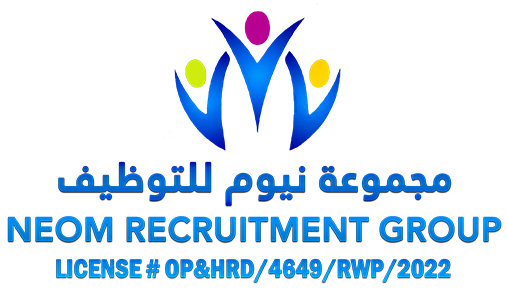After the disruptions brought about by COVID-19, post-Pandemic years have witnessed a tremendous evolution in the workplace. Technological advancements have given birth to a new breed of recruiters as workforce recruitment trends are continuing to evolve. The job market has gotten much more competitive, with AI-powered hiring and Zoom interviews becoming the new normal. Today, technology-empowered headhunters are motivated, savvy, and highly strategic in hunting the right talent for the job. It’s also easier for candidates to apply and interview for multiple positions than in the past.
Recruitment Trends 2024
Recruiters are increasingly using social media platforms, web-based job boards, and online job portals nowadays. However, some companies still deploy traditional methods of recruiting, they should now shift their focus to new recruitment trends. Below are some Neom top recruitment trends in 2024 that businesses and HR professionals should be aware of in 2024 and beyond.
Employer branding
In today’s era, a company’s reputation and popularity mainly depend on its employer brand and its social media presence. Amidst a highly competitive talent market, a compelling employer brand is a key to attracting qualified talents.
Implementing robust branding strategies is becoming more crucial to creating an attractive employer brand. Nowadays, job seekers research employer brands and reputations before they apply for a job. It helps in building a dynamic workforce and influences a brand’s success.
According to a survey, businesses with excellent employer brands and great brand images receive 50% more qualified applicants. Whereas businesses plagued with a bad reputation find it hard to attract new talents and retain hired ones.
Hybrid work model
Post-pandemic, many companies have given their staff the liberty to work from home. The hybrid work model has been normalized just as the traditional office model. Giving your employees the flexibility to work remotely has proved to be extremely cost-effective for organizations.
During the initial lockdowns, it was expected that employees will return to on-site work mode but as the lockdown continued, they became accustomed to working from home.
Hybrid work is a flexible work model that supports a blend of in-office, remote, and hybrid workers. It offers employees the flexibility to work in a mixed environment that promotes productivity. At the same time, it is a cost-effective model for both the staff and the employer.
Diversity and inclusion in the workplace
A diverse and inclusive workplace makes every employee, regardless of who they are or what is their input, feel equally involved in and supported in all areas of the workplace. These questions truly reveal diversity and inclusion in your workplace.
- Do you have diversity in your recruitment processes in each of your departments?
- Do you have a good representation of employees of all colors, but are all of them in the same department?
- You have a workplace where 50% of your employees are women but what percentage of your women are managers?
Research has shown numerous benefits of a diverse and inclusive workplace:
- Higher revenue growth
- Greater willingness to innovation
- Increased ability to recruit a diverse talent pool
- Inclusion in the workplace is the key to higher employee retention
Business leaders around the globe believe that a culturally diverse workforce fuels, creativity, innovation, and higher profitability. Our population is as a whole, diverse. Companies without diverse and inclusive strategy lack innovation and fresh and qualified prospects for their business.
The main goal of diverse and inclusive practice is to construct a workforce that reflects the available labor market, where all talent groups should be equally represented and shouldn’t exclude anyone because of what makes them different.
Use of Recruiting Automation

Automation and other digital recruitment trends have been around for a while now. 2024 will witness more recruiting and staffing firms switching to automation for the purpose of simplifying repetitive tasks and reducing admin work. Investing in better-recruiting tools and the latest technology is the best way to improve recruiter performance.
HR automation tools are increasingly used by recruiters in their hiring process. By automating such tasks, these tools help streamline recruitment, which makes it more efficient and faster.
These integrated technology solutions help to locate, attract, engage, and nurture the candidates so that they become applicants. Many firms are using AI-automated solutions in their recruitment processes to source and screen candidates and schedule them for interviews.
AI-based headhunting
AI recruiting is the use of artificial intelligence for the talent acquisition process. The tasks including auto-screening candidates, evaluation, managing communication, conducting interviews effectively, and assessing candidates can be carried out by using AI technology. A large number of applications in AI help recruiting professionals hire the workforce faster, smartly, and without any bias.
Artificial intelligence-based recruitment software has already penetrated many companies and HR hiring departments and the initial results are promising. The companies agree that AI technology is not meant to replace recruiters at all. But It’s redesigned to improve and assist recruiters in their roles.
Unlike people, AI screen and selects new hires without any biases. But such a highly objective recruitment process takes time to achieve. The inculcation of AI into the recruitment process has many more benefits:
- Improve the Quality and Objectivity of Recruitment
- Remove manual tasks
- Attract the right talent and receive Less Irrelevant Applications
- Assist recruiters in the recruitment process
- Save Time and Fill Positions Faster and more effectively
- Enhance the Employer Brand.
- Improves the candidate’s overall experience.
The use of AI in hiring will continue to increase in coming years, such as in pre-screening, new hire monitoring, and onboarding programs.
Reliance on Social Media Recruiting
One of the most popular recruitment trends nowadays is social media recruiting. Social media recruitment is an advanced way of talent acquisition. It is used to find and engage with potential candidates. Over 90% of recruiters are now using social networking sites in their recruitment process. While the traditional resume contains only a chunk of information about the candidate, social media accounts open the door to the potential employee’s work, qualifications, experience, personality, interests, and so on.
During the Coronavirus outbreak, many people turned to social media in order to stay connected and informed. This made social media channels an extremely important platform for companies to connect with job seekers.
In fact, nowadays, some professional candidates also use their social media accounts to showcase their work, skills experience, and qualification to attract prospects. This gives employers an initial preview of their professional abilities. LinkedIn, Facebook, and Twitter are on the top lists of recruiters for posting advertisements for Job vacancies. It provides extensive and easy access to professional candidates. There are numerous advantages of social media recruitment such as:
Advantages of Social Media Recruitment
- Social media-based recruiting allows one-on-one engagement. This approach makes candidates feel they’re valued.
- It is less time-consuming than a typical recruitment process as candidates’ information displayed on social platforms can offer the employer a glimpse into their experience, qualification, and interests
- Posting a job on social media platforms like a Facebook group, Facebook pages or LinkedIn costs nothing and saves a lot of resources for the company.
- Self-reported statistics from several companies show that they get excellent and more qualified candidates when they recruit via social networking websites.
- As social media is mostly used by the youth segment of society, especially fresh graduates. Hence your company can get a chance of choosing from a pool of fresh talents, who have innovative ideas and skills.
- Social recruiting is successful not just in fetching you the ideal candidate, but also in increasing the visibility of your brand. With a robust social medical presence and advertising new positions and openings on social media, more candidates get attracted and aware of the brand.
- If a job opening is posted on a social media channel using the right procedure, it makes your advertisement available to a wider range of audiences and candidates.
- If you have an open position that needs to be filled in the shortest time possible, social media is the platform to consider
Related: Social Media Recruitment
Transformation of Recruiters into business leaders

“In the future, recruiters will look more and more like HR business partners.” Tristan Klotsch, Vice President of HR at Serrala.
As of now, Recruiters are considered order-takers. But, no more. In the coming time, recruiting will increasingly be recognized as a strategic role. Recruitment agencies and recruiters will be expected to bring a perspective, push back, and lead the way forward. That means aligning with the client’s business goals and advising clients on the best way to achieve them.
Recruiting will get more creative and complex as the most administrative and routine parts of work get automated. It will become less about execution and more about talent strategy. The recruiters will be responsible for anticipating hiring managers’ needs, solving their problems, and spotting opportunities for them.
These trends mentioned above will help companies adjust to the newly evolved workplace. As companies continue to search for top talent in the midst of a competitive job market, having knowledge of effective strategies gives them a considerable edge over competitors.
No matter what hiring strategy or technology is trending, the basic objective of workforce hiring strategies is to attract the right talent in a way that enhances the candidate experience. Technology is meant to support, not replace human recruiters. These essential tools will help enhance the capabilities of HR professionals and recruiters and will continue to advance in the upcoming years.

